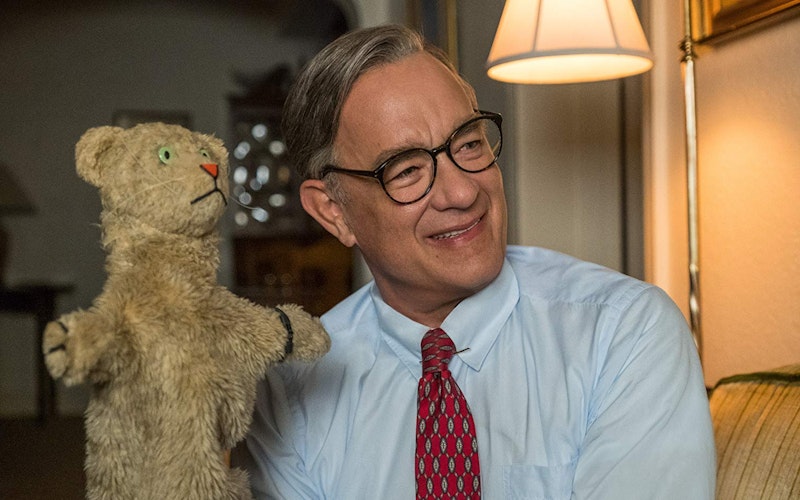
Movies
Saving with Kindness
When Lloyd Vogel first meets Mr. Rogers in A Beautiful Day in the Neighborhood, no one is happy.
Lloyd (Matthew Rhys) has just had a fight with his wife. Mr. Rogers' handler (Enrico Colantoni) is angry that Rogers has agreed to meet with Lloyd, a journalist who's made a name for himself publishing take-downs of celebrities. The whole crew of Mr. Rogers' Neighborhood is grumpy because they're an hour and a half behind their shooting schedule. And perhaps no one is angrier than the young boy standing on the set, swinging a toy sword at the man of the (half) hour.
The cause of the delay, it turns out, is Fred Rogers himself (Tom Hanks), who has apparently been crouching in front of this boy (and his mortified parents) for the last 90 minutes. Mr. Rogers speaks in his soft, gentle tone, asking the boy questions, making observations, and ignoring the beleaguered parents' exasperation. Lloyd stares dumbstruck, then asks the handler if this is a "Make a Wish thing.”
Maybe it is, and maybe it's not. It turns out it's hard to tell what will captivate the attention of Mr. Rogers. Until, that is, you're the one in front of him and he says, "Hello, neighbor." Fred Rogers believed every person was a potential friend, and he saw the space between himself and another person as a sacred opportunity to create kinship. It didn't matter whether that space was real, as it comes to be for Lloyd Vogel, or virtual, as it was for those of us who grew up making regular trips to Mr. Rogers' Neighborhood (and as it is for those watching this new film).
A Beautiful Day in the Neighborhood opens with a recreation of an episode of Mr. Rogers' Neighborhood. Director Marielle Heller even employs the square, 4:3 aspect ratio of classic television as Mr. Rogers enters his house, trades his jacket for that famous red cardigan, and then sits to take off his shoes, all the while singing those iconic bars, "It's a beautiful day in the neighborhood…" When he's done, he smiles, looking directly into the camera, and says, "Hello there, neighbor."
Mr. Rogers didn't see a fourth wall in his programming because his goal wasn't to create an illusion, as other TV shows do. Rather, Rogers created proximity between his viewers and himself. So, too, the film invites us to hear a true story (and it is mostly true, according to Tom Junod, the journalist on whom Lloyd is based). Nothing was more important to Rogers than people—not even his beloved, award-winning TV show.
Rogers created proximity between his viewers and himself.
The word that surfaces over and over to describe Mr. Rogers is kind. I can't help but think that, as an ordained minister, Rogers would be glad for this particular virtue to be his legacy. It's easy to brush kindness off as weakness, to confuse it with the shallow, cool distance of nice. But the root of kind is kin, as in family. To be kind is to extend my family circle to include you. To be kind is to reach through the fourth wall we erect in our everyday lives, to look you in the eye, and say, "Hello neighbor."
Paul makes much of God's kindness toward us in Romans. The first chapters of the book are an extended argument for God's love for us. Paul observes that "while we were God’s enemies, we were reconciled to him through the death of his Son." It's because God chose to break into our reality in the person of Jesus that we can become part of God's family. And this is a kindness we are not to take lightly. As Paul writes, “Or do you show contempt for the riches of his kindness, forbearance and patience, not realizing that God’s kindness is intended to lead you to repentance?" This is the kindness that makes neighbors out of Samaritans and Syrophoenician women, tax collectors, Roman centurions, and murderers.
In A Beautiful Day in the Neighborhood, Mr. Rogers uses kindness to make a friend out of Lloyd Vogel—and us, the viewers. Over lunch in a cafe, Lloyd wonders why Mr. Rogers loves “broken people” like him. In response, Mr. Rogers asks Lloyd to take a full minute to think of the people who have loved him (a variation on the speech he gave when receiving his Lifetime Achievement Emmy). Improbably, everyone in the cafe stops what they’re doing in response to Mr. Rogers’ instructions. And then Mr. Rogers looks into the camera—not just into the camera, but through the camera, inviting us, the viewers, to join him and Lloyd in these holy seconds of gratitude.
Fred Rogers' kindness was evident in the way he made himself present for every person. Nothing else mattered like the person right in front of him because, for Mr. Rogers, that person, in that moment, was his family. Will we join Mr. Rogers in expanding the neighborhood? Will we insist on radical presence with those we encounter? Will we choose to see everyone as a potential neighbor, a soon-to-be brother or sister? Will we allow God's kindness to lead us to repentance, and will we offer that kindness to the world in response?
Topics: Movies